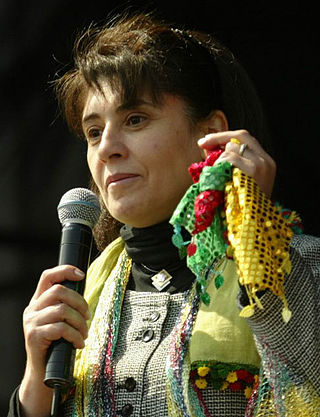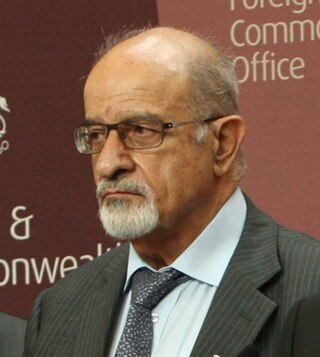Related Research Articles

Abdullah Öcalan, also known as Apo, is a political prisoner and founding member of the militant Kurdistan Workers' Party (PKK).

Human rights in post-invasion Iraq have been the subject of concerns and controversies since the 2003 U.S. invasion. Concerns have been expressed about conduct by insurgents, the U.S.-led coalition forces and the Iraqi government. The U.S. is investigating several allegations of violations of international and internal standards of conduct in isolated incidents by its own forces and contractors. The UK is also conducting investigations of alleged human rights abuses by its forces. War crime tribunals and criminal prosecution of the numerous crimes by insurgents are likely years away. In late February 2009, the U.S. State Department released a report on the human rights situation in Iraq, looking back on the prior year (2008).

Leyla Zana is a Kurdish politician. She was imprisoned for ten years for her political activism, which was deemed by the Turkish courts to be against the unity of the country. She was awarded the 1995 Sakharov Prize by the European Parliament but was unable to collect it until her release in 2004. She was also awarded the Rafto Prize in 1994 after being recognized by the Rafto Foundation for being incarcerated for her peaceful struggle for the human rights of the Kurdish people in Turkey and the neighbouring countries.

The Northern Alliance, officially known as the United Islamic National Front for the Salvation of Afghanistan, was a military alliance of groups that operated between early 1992 and 2001 following the dissolution of the Soviet Union. At that time, many non-Pashtun Northerners originally with the Republic of Afghanistan led by Mohammad Najibullah became disaffected with Pashtun Khalqist Afghan Army officers holding control over non-Pashtun militias in the North. Defectors such as Rashid Dostum and Abdul Momim allied with Ahmad Shah Massoud and Ali Mazari forming the Northern Alliance. The alliance's capture of Mazar-i-Sharif and more importantly the supplies kept there crippled the Afghan military and began the end of Najibullah's government. Following the collapse of Najibullah's government the Alliance would fall with a Second Civil War breaking out however following the Islamic Emirate of Afghanistan's (Taliban) takeover of Kabul, The United Front was reassembled.

The situation for human rights in Syria is considered one of the worst in the world and has been globally condemned by international organizations like the United Nations, Human rights Watch, Amnesty International, and the European Union. Civil liberties, political rights, freedom of speech and assembly are virtually non-existent under the Ba'athist government of Bashar al-Assad; which is regarded as "one of the world's most repressive regimes". The 50th edition of Freedom in the World, the annual report published by Freedom House since 1973, designates Syria as "Worst of the Worst" among the "Not Free" countries. The report lists Syria as one of the two countries to get the lowest possible score (1/100).

The 1996–2001 Afghan Civil War, also known as the Third Afghan Civil War, took place between the Taliban's conquest of Kabul and their establishing of the Islamic Emirate of Afghanistan on 27 September 1996, and the US and UK invasion of Afghanistan on 7 October 2001: a period that was part of the Afghan Civil War that had started in 1989, and also part of the war in Afghanistan that had started in 1978.
Anwar al-Bunni is a Syrian human rights lawyer who has defended clients such as Riad al-Turk, Riad Seif, the owner of The Lamplighter,, Kurdish protesters, and "dozens of others."

The Afghan conflict refers to the series of events that have kept Afghanistan in a near-continuous state of armed conflict since the 1970s. Early instability followed the collapse of the Kingdom of Afghanistan in the largely non-violent 1973 coup d'état, which deposed Afghan monarch Mohammad Zahir Shah in absentia, ending his 40-year-long reign. With the concurrent establishment of the Republic of Afghanistan, headed by Mohammad Daoud Khan, the country's relatively peaceful and stable period in modern history came to an end. However, all-out fighting did not erupt until after 1978, when the Saur Revolution violently overthrew Khan's government and established the Democratic Republic of Afghanistan. Subsequent unrest over the radical reforms that were being pushed by the then-ruling People's Democratic Party of Afghanistan (PDPA) led to unprecedented violence, prompting a large-scale pro-PDPA military intervention by the Soviet Union in 1979. In the ensuing Soviet–Afghan War, the anti-Soviet Afghan mujahideen received extensive support from Pakistan, the United States, and Saudi Arabia in a joint covert effort that was dubbed Operation Cyclone.
The 2004 Qamishli riots were an uprising by Syrian Kurds in the northeastern city of Qamishli in March 2004, which culminated in a massacre by the Syrian Arab Armed Forces.

Haitham al-Maleh is a Syrian human rights activist and former judge. He is a critic of the current Syrian government under Bashar al-Assad and has been imprisoned by the Syrian government because he was calling for constitutional reforms. Maleh became an important opposition figure in the Syrian Civil War.
Dr Ammar Al-Qurabi is a Syrian human rights activist and executive director of the National Organization for Human Rights in Syria since April 2006. He was elected in April 2011 as member of the board of trustees of the Arab Human Rights Organization in Syria.
Ali al-Abdallah is a Syrian writer and human rights activist.
Adra Prison is a prison in Syria, on the northeast outskirts of Damascus. Political prisoners are held in the prison, along with a mixture of civil prisoners such as traffic offenders, murderers, and drug dealers. In 2014, the prison held more than 7,000 inmates, a dozen of them women, in space designed for 2,500. The Washington Post referred to the prison as "infamous".

War crimes in the Syrian civil war have been numerous and serious. A United Nations report published in August 2014 stated that "the conduct of the warring parties in the Syrian Arab Republic has caused civilians immeasurable suffering". Another UN report released in 2015 stated that the war has been "characterized by a complete lack of adherence to the norms of international law" and that "civilians have borne the brunt of the suffering inflicted by the warring parties". Various countries have prosecuted several war criminals for a limited number of atrocities committed during the Syrian civil war.

The Kurdish National Council is a Syrian Kurdish political party. While the KNC had initially more international support than the ruling Democratic Union Party (PYD) during the early years of the Syrian civil war and a strong supporter basis among some Syrian Kurdish refugees, the overwhelming popular support the PYD enjoys has eroded support for the KNC in Syrian Kurdistan, losing almost all popular support.

The Autonomous Administration of North and East Syria is a de facto autonomous region of Syria that emerged from 2012 onwards during the Syrian civil war and in particular the Rojava conflict. The current administration emphasises gender equality and pluralistic tolerance for religious and cultural diversity.
Nizar Nayyouf is a Syrian journalist, human rights activist, and dissident. He was one of the founding members of the Committee for the Defence of Democratic Freedom, a banned political organization in Syria, as well as editor-in-chief of صوت الديمقراطيِّة Sawt al-Democratiyya. He has criticized the Syrian government for human rights abuses, for which he was arrested and sentenced to ten years' imprisonment in 1991, most of which he spent in Mezzeh prison outside Damascus.

The Kurdish Democratic Progressive Party in Syria is one of the oldest Kurdish parties in Syria, having been active since seceding from the Kurdistan Democratic Party of Syria the 1960s. Prominently led by Abd al-Hamid Darwish for much of its history, who was described as "one of the last remaining of the original Kurdish political activists", the PDPKS serves as the Syrian sister party of the Iraqi Patriotic Union of Kurdistan. Known for its moderate and conciliatory politics, the party has sided at different times during the Syrian Civil War with the Syrian opposition, the Ba'athist government, the Kurdish National Council, and the Democratic Union Party.
Ibrahim biro, head of the Yekiti Kurdistan Party - Syria, from March 2013 to late December 2018. Born in the city of Amouda July 7, 1965 of the Syrian province of Hasakah. He received his high school diploma from the city's high school and continued his studies at the Intermediate Institute of Railways in Aleppo in 1985. To work as a civil servant at the Syrian Railways Corporation one year after graduating.

Yaşar Kaya was a Turkish-Kurdish politician and publisher of the pro-Kurdish newspaper Özgür Gündem. Together with authors like Ismail Besikçi and Musa Anter, he was a co-founders of the Kurdish Institute of Istanbul in 1992.
References
- ↑ Zarwan, Elijah (2005). Human Rights Watch False Freedom Online Censorship in the Middle East and North Africa . Retrieved June 14, 2011.
- ↑ (Organization), Human Rights Watch (2009). Far from justice: Syria's Supreme State Security Court. Human Rights Watch. ISBN 9781564324344 . Retrieved June 14, 2011.
- ↑ "Massoud Hamid is awarded the 2005 cyberfreedom prize". 21 May 2024.